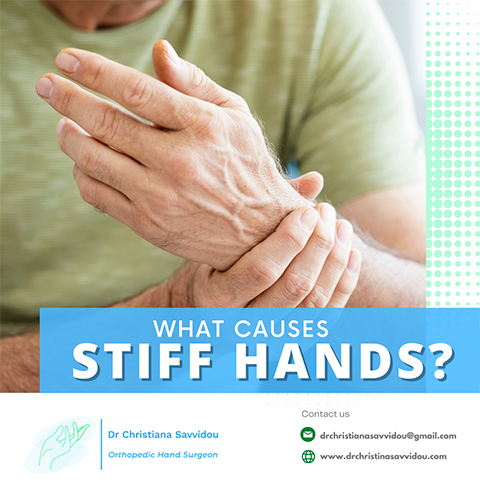What causes Stiff Hands?
We use our hands for nearly everything on daily basis. Stiff hands can stop you from completing everyday tasks and activities. Examples are opening jars, lifting objects, picking up your child, cooking, and more. The stiffness may be all the time or come and go.
If a hand becomes stiff, it can be caused by many reasons, some more serious than others. Potential causes of stiff hands:
- Arthritis: Many different types of arthritis can affect the hands, including:
-
Rheumatoid arthritis - Rheumatoid arthritis is caused by inflammation of the joints and can affect many joints, not just the hands. Typically involves the wrist and finger joints, causing the joints to be swollen and painful.
-
Osteoarthritis - This type of arthritis affects the smooth cartilage in your joints. Frequently can cause your hands to feel stiff, painful, and swollen.
- Psoriatic arthritis - Sometimes seen together with psoriasis (a skin condition),
- Fractures: A hand fracture is a medical term for a broken hand. If you've broken your hand, it will feel stiff and painful. It's important to talk to your hand doctor to make sure your recovery is tailored to your needs.
- Dislocations: Any upper extremity dislocation can cause hands to feel stiff both during and after the injury, similar to a broken bone. Your hand doctor may give you instructions for exercises, hand movements, to help with the stiffness.
-
Bad sprains: A sprained finger is an example of an injury that could cause stiffness. A sprain means you have injured the ligament, and it can prevent you from using your hand to perform daily tasks while you are recovering.
- Tendon and muscle injuries: Tendon injuries can happen due to an injury or even a cut on the hand. Flexor tendon injuries in particular happen from a deep cut.
Be sure to see a hand surgeon if you are feeling stiffness in your hands. The sooner you receive a diagnosis, the faster and better your recovery will be. Delaying treatment can lead in permanent stiffness. Sometimes the cause of stiffness is unknown, which is why your hand doctor may need to perform further tests. Doctor may recommend exercises, use of splints or a cast, or even do surgery to help you recover. The appropriate treatment will be tailored to your condition and needs.


